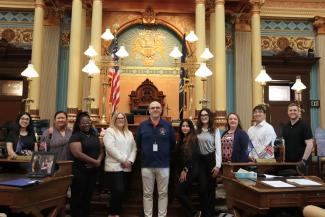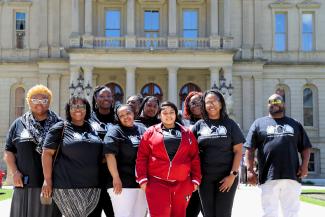Michigan lawmakers opened their doors (and their Zoom links) to meet with Ecology Center staff and lead poisoning prevention advocates last week on May 7th and 8th. Organizations and individuals working together under the banner of the Michigan Alliance for Lead Safe Homes (MIALSH) spoke to state representatives, senators, and their staff both virtually and in Lansing. Ecology Center's Lead Policy Priorities
The significance of MIALSH's mission cannot be overstated: to prevent childhood lead poisoning. A pivotal part of our strategy is the annual Lead Education Day, a crucial platform that empowers lead-impacted families, health professionals, and concerned citizens to directly address lawmakers and shape legislative action around lead prevention.
This past fall, Michigan took big steps forward to detect and prevent childhood lead poisoning by passing Universal Lead Testing and Filter First. Years of advocacy helped educate lawmakers about the importance of testing all 1—and 2-year-olds in Michigan for lead and the need to provide hydration stations with water filters in all schools and daycare centers.
Building on the momentum of our past achievements, we spoke to lawmakers about three new bills, each with the potential to significantly advance our lead poisoning prevention efforts:
- Renovation, Repair and Painting Act (RRP): The EPA Renovation, Repair and Painting Rule is a current federal regulation requiring contractors to follow lead-safe practices when working on old houses (built before 1978). Fixing old houses can disturb lead paint, create lead-laden dust, and expose families and workers. HB 4532 calls for the adoption of RRP as state law, giving Michigan oversight of the program and enabling Michigan to expand RRP, ensuring that contractors working on old homes are certified, and tailoring RRP to the needs of Michigan communities.
- HB 5368: This bill drops the 'level of concern' for lead-poisoned kids from 5 to 3.5 ug/DL to align with the Centers for Disease Control's level of concern.
- HB 5369 automatically qualifies lead-poisoned children for Early On, Michigan’s system of health care services for infants and toddlers with developmental delays. This automatic referral will be a vital companion to Universal Testing. Once more children are tested, more lead poisoning will be identified. Families and health care providers will need an easy pathway to support services.
Lead Education Days not only provide a platform for dialogue with lawmakers, but also foster a sense of community among advocates, facilitating mutual learning and support. The Ecology Center extends its heartfelt gratitude to all those who shared their knowledge and experiences. These advocacy days serve as a powerful reminder that everyday citizens are integral to the legislative process. In every office and Zoom meeting, lawmakers and their staff appreciated the input from concerned Michiganders. Together, we send a powerful message.
Next time, will you join us?





